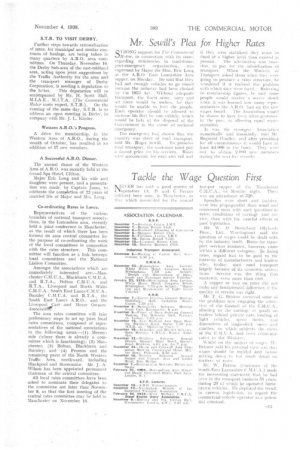Tackle the Wage Question First
Page 47

If you've noticed an error in this article please click here to report it so we can fix it.
MEVER has such a good muster of N operators (A, B and C licence holders) been seen, in Manchester, as that which assembled for the annual hot-pot supper of thy Manchester on Monday night. Theo. was an attendance of "i20.
Speeches were short and incisive. were less propagandist than usual and concerned more with such questions a= rates, conditions of carriage and service, than with the baneful effects at past legislation.
Mr. IV. readl len t yla n ds Bros.. Ltd., Wa rring toi ) said the question of wages could be dealt with by the industry itself. Rates for transport services rendered, however, came within a different category. In fixing rates, regard had to be paid to the interests of manufacturers and traders who, to-day, used road transport largely because of its economic attractions. Service was the thing that mattered, even more than cost.
A copper or two on rates did not make any fundamental difference, it the quality of service was right.
Mr. F. G. Bristow surveyed some of the problems now engaging the attention of the Council of the C.M.U.A.. alluding to the carriage of goods on trailers behind private cars, loading of light vehicles, speed limits, and dimensions of single-deck buses and coaches, on which subjects the views of the C.M.U. A_ had teen
cntriinuni
rated to the Ministry.
Whilst on the subject of wages, Mr. Bristow said his personal view was that wages should be tackled first be lore ,getting down to too much detail on matters of rates.
Mr. W. Patton (chairman of the Stint h-East Lancashire C.M.U.A.) made the interesting statement that he had been in the transport business years. during 26 of which he operated horsedrawn vehicles. He deplored the trend, in current legislation. to regard the commercial-vehicle operator as a potential criminal.




















































































